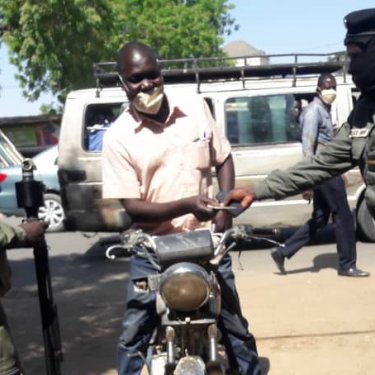Chadian radio stations on strike in protest against violent raid

Reporters Without Borders (RSF) unreservedly condemns last week’s violent police raid on a Chadian radio station in which 30 journalists were arrested – prompting dozens of radio stations to suspend broadcasting today in protest. The Chadian authorities must end the growing threats to media independence and allow journalists to work freely, RSF says.
The Chadian Union of Privately-Owned Radio Stations (URPT) has called on all of its members, around 40 broadcasters, to stage a one-day strike today in protest against the raid on N'Djamena-based Radio FM Liberté, a popular, independent radio station that specializes in covering human rights-related subjects.
The police raided the station on the morning of 27 November, when it was planning to interview the organizers of a citizens’ forum that had been banned the day before. After discharging teargas in the station’s courtyard, they arrested nearly 70 people, including 30 journalists, some of whom were roughed up. They were released four hours later.
The grounds given by the police for the raid was the ban on holding the forum and a prohibition of gatherings of more than 50 people during the pandemic.
Blaise Dariustone, one of the Radio FM Liberté journalists who was arrested and also Deutsche Welle correspondent, told RSF that an intern suffering from the effects of the teargas had to be hospitalized. Dariustone also said he was personally threatened by the head of police intelligence.
“The security forces who raided this radio station used very violent methods, as if they were trying to break up a gathering of criminals,” said Arnaud Froger, the head of RSF’s Africa desk. “We unreservedly condemn this completely disproportionate use of force and the arbitrary arrests of journalists who were just doing their job, and we urge the authorities to safeguard the freedom of journalists to interview whomever they wish. The brutality of this raid is all the more worrying for having come at a time of serious threats to Chadian press independence.”
Chad’s news media have become increasingly concerned in recent weeks. In September and October, the High Authority for Media and Broadcasting (HAMA) suspended 12 newspapers for three months and threatened other media outlets with the same fate if they did not comply with a new law under which publishers and managing editors must, at the very least, have a postgraduate degree in journalism.
RSF pointed out to the authorities that, under international law, a lack of academic qualifications cannot be used to restrict access to journalism or the management of media outlets. Enforcement of this new provision would result in the disappearance of around 15 publications including some of Chad’s oldest independent newspapers.
Chad is ranked 123rd out of 180 countries in RSF's 2020 World Press Freedom Index.



